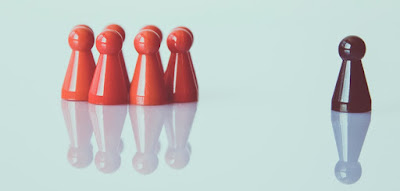What can math tell us about unfairness? by Cailin O'Connor, associate professor of logic and philosophy of science and a member of the Institute for Mathematical Behavioral Science at the University of California, Irvine.
 |
| Photo: Markus Spiske on Unsplash |
Bias, discrimination, and inequity are phenomena that are deeply complex, context sensitive, personal, and intersectional. The mathematical modeling of social scenarios, on the other hand, is a practice that necessitates simplification. Using models to understand what happens in our social realm means representing the complex with something much less complex in order to study it.
Nonetheless, when used carefully models can help us learn about deep patterns related to inequity, including those that govern how unfair norms and patterns of behavior emerge in groups of people. They are especially useful in highlighting spaces of possibility. What might happen in the complex dynamics of the social realm? Once we answer this question, we can use experiments and experimental studies to learn more about these possibilities.
In recent work by fellow modelers and myself, we’ve looked in particular at what minority status means for patterns of unfair behavior. Suppose you are part of a company where people work together, but are still figuring out some of the social rules for how this is done. Suppose further that men make up the majority of workers and women the minority. And lastly suppose, as argued by Cecilia L. Ridgeway in Framed by Gender, that like most humans your coworkers notice gender, and use it to shape their interactions with others in ways that can be subtle (and sometimes not-so-subtle). In a case like this, even without gender biases coming into play, women can end up disadvantaged...
Evolutionary biologists have shown that when it comes to mutualistic interactions between species, sometimes the species that evolves more quickly ends up at a disadvantage simply by dint of this quick evolution. This is called The Red King Effect. Surprisingly, starting with the work of Justin Bruner, it has become clear that a similar thing might happen in the cultural realm. How?
Read more...
Recommended Reading
 |
| The Origins of Unfairness: Social Categories and Cultural Evolution |










